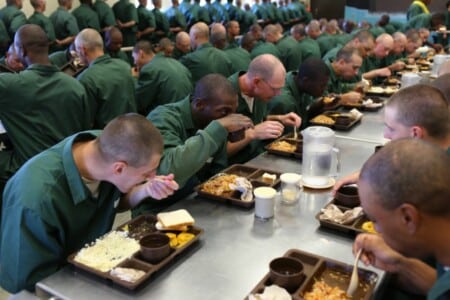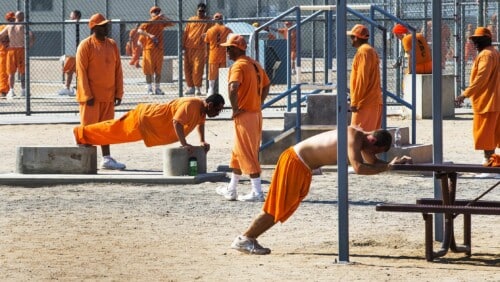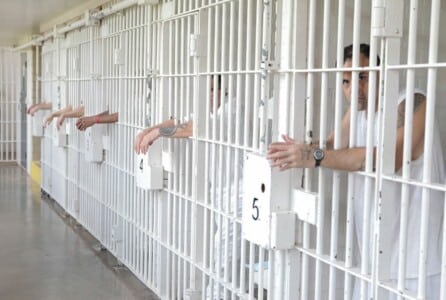Table of Contents
What is a federal prison?
A federal prison is a facility operated by the United States Bureau of Prisons (BOP) to house inmates convicted of federal crimes. The BOP is a federal agency that is responsible for the administration of the federal prison system.
The purpose of a federal prison is to punish inmates who have committed federal crimes and to rehabilitate them so that they can return to society as law-abiding citizens.
Some of the people who are sent to federal prison include:
- Those who have been convicted of federal crimes, such as bank robbery, drug trafficking, or murder.
- Those who have violated the terms of their probation or parole.
- Those who have been arrested for a federal crime but have not yet been convicted.
- Those who are awaiting trial for a federal crime.
What does a typical day look like for an inmate?

A guard awakens an inmate in a federal prison at 6:00 a.m. to begin their typical day. They are then given a short time to get ready for breakfast, which is typically served at 6:30 a.m. After breakfast, inmates are given work assignments. These assignments can vary depending on the inmate’s security level and the needs of the prison. Some common work assignments include cleaning, cooking, and repairing equipment.
After work assignments, inmates are given a few hours of free time. They can use this time to read, write, watch television, or participate in recreational activities. Some common recreational activities include playing sports, attending classes, and attending religious services.
At 4:00 p.m., inmates are given dinner. After dinner, they are locked into their cells for the night. Inmates are typically required to stay in their cells until 6:00 a.m. the following morning.
What are the different types of work assignments?
There are a variety of work assignments that inmates can be assigned to in a federal prison, including:
- Cleaning the prison’s grounds, buildings, and cells.
- Cooking meals for the prison’s population.
- Repairing equipment such as furniture, appliances, and vehicles.
- Laundry: Inmates may be assigned to wash, dry, and fold laundry.
- Grounds crew: Inmates may be assigned to maintain the prison’s grounds, such as mowing lawns, trimming hedges, and planting flowers.
- Industries: Inmates may be assigned to work in industries that produce goods that are sold to the public. These industries may include manufacturing, agriculture, and construction.
What are the different types of recreational activities?

There are a variety of recreational activities that inmates can participate in in a federal prison. Some common recreational activities are:
- Sports: usually basketball, volleyball, and soccer
- Classes: education, vocational training, and religious services
- Religious services: including Christian, Muslim, and Jewish services
- Hobby classes: such as art, music, and writing
- Library: use of the prison’s library to read books, magazines, and newspapers
- Television: Inmates may watch television in the prison’s common areas
- Video games: There are usually video games available in the prison’s recreation areas
What are the different types of visits?
There are a variety of visits that inmates can receive in a federal prison, including:
- Family visits: visits from family members, such as their parents, siblings, and children
- Friends visits: visits from friends
- Legal visits: visits from their lawyers or other professionals
- Medical visits: visits from their doctors or other medical professionals
The length of a visit and the frequency of visits can vary depending on the inmate’s security level and the rules of the prison.
Challenges of life in a federal prison
The challenges of life in a federal prison are many. Inmates are confined to a small space, they are subject to violence, they are exposed to noise, and they must follow strict rules. This can be a difficult environment for anyone to live in, and it can be especially difficult for inmates who are not used to being confined.
Confinement
Life in a federal prison is a highly regimented and controlled environment. Inmates are typically confined to their cells for long periods of time, and they are allowed to leave their cells only for specific activities, such as work, recreation, and visits. This can be a difficult adjustment for inmates who are used to being able to move around freely.
Violence
Violence is a serious problem in federal prisons. Inmates are often the victims of violence, and they may also be the perpetrators of violence. This can be a dangerous environment for inmates, and it can also make it difficult for them to focus on their rehabilitation.
Noise
The noise in a federal prison can be deafening. Inmates are constantly bombarded with the sound of other inmates talking, arguing, and fighting. This can be a major source of stress for inmates, and it can also make it difficult for them to sleep or concentrate.
Rules and regulations
There are a lot of rules and regulations that inmates in federal prisons must follow. These rules can be very strict, and they can be difficult to remember. Whoever breaks the rules can be punished, which can make it even more difficult for them to adjust to life in prison.
How to cope with the challenges of life in a federal prison
There are a few things that inmates can do to cope with the challenges of life in a
federal prison.
- Find ways to make their cells more comfortable
- Bringing in personal items such as photos, books, and music
- Making friends with other inmates
- Trying to stay positive
- Focusing on their rehabilitation and on plans for the future
- Staying in touch with family and friends
- Trying to find ways to relax, such as exercise, meditation or reading
- Getting involved in activities that they enjoy
How to make the most of life in a federal prison
Making the most of life in a federal prison can be challenging, but there are things inmates can do.
- Take advantage of the education and vocational training programs
- Take advantage of the medical and mental health services
- Inmates can work which can help them to earn money and develop new skills
- Try to stay positive by focusing on their rehabilitation and plans for the future
- Stay in touch with family and friends
Benefits of Life in a federal prison
Despite the challenges of life in a federal prison, there are some benefits that inmates can experience.
Education and job training
Federal prisons offer a variety of education and job training programs to inmates. These programs can help inmates earn a high school diploma, a college degree, or a vocational certificate. They can also help inmates learn new skills, such as how to operate a computer or how to weld.
There are many benefits that education and job training programs in federal prisons can bring to inmates. These programs can help inmates to:
- Earn a high school diploma or college degree, which can improve their job prospects when they are released from prison
- Learn new skills, which can help them find a job when they are released from prison
- Improve their self-confidence and self-esteem
- Develop a sense of purpose and direction in their lives
Medical care and counseling services
Federal prisons also offer a variety of medical care and counseling services to inmates. Inmates will have the ability to:
- Receive medical care for physical and mental health problems
- Receive counseling for emotional and psychological problems
- Develop a plan for their health and well-being when they are released from prison
The benefits of medical care and counseling services in federal prisons are numerous. These services can help inmates to:
- Receive the medical care they need
- Develop coping mechanisms for dealing with stress and anxiety
- Develop a plan for their health and well-being when they are released from prison
Family and friends
Federal prisons also allow inmates to have contact with their family and friends. This helps inmates to:
- Stay connected with their loved ones
- Receive emotional support
- Have a sense of normalcy
Having family and friends visit you in federal prison is extremely beneficial. These relationships can help inmates to:
- Stay connected with their loved ones
- Receive emotional support
- Have a sense of normalcy
- Stay motivated to rehabilitate themselves
- Plan for their future when they are released from prison
The challenges facing the Bureau of Prisons
The Bureau of Prisons (BOP) is facing a number of challenges, including:
- Overcrowding: The BOP is currently operating at over 120% capacity. This overcrowding is putting a strain on the agency’s resources and making it difficult to provide quality care to inmates.
- Violence: Violence is a major problem in federal prisons. Inmates are most often the victims of violence, but it can also affect the prison guards.
- Staffing shortages: The BOP is facing a staffing shortage. This shortage is making it difficult to provide adequate security and to provide quality care to inmates.
- Inmate health care: Inmate health care is a major concern. Inmates often have difficulty accessing quality health care, and they may not receive the care they need.
- Rehabilitation: The BOP is struggling to rehabilitate inmates. Inmates who are not rehabilitated are more likely to reoffend when they are released from prison.
The future of federal prisons
The future of federal prisons is uncertain. The BOP is facing a number of challenges, and it is unclear how the agency will address them. However, there are some potential solutions to the problems facing the BOP, including:
- Reducing the inmate population: Sentencing fewer people to prison, by releasing more inmates early, or by using alternatives to incarceration.
- Increasing staffing: Recruiting more staff, by providing more training, or by offering more incentives.
- Improving inmate health care: Providing more training and incentives to staff, or by providing more resources to the BOP.
- Improving rehabilitation: Providing more training and incentives to staff and providing more resources to the BOP. Adding new rehabilitation programs.
Frequently Asked Questions (FAQs)
What are the living conditions like in a federal prison, including the quality of food, housing, and medical care?
Living conditions in federal prisons are generally spartan and provide minimal comfort or privacy. Housing typically consists of small cells or dormitory-style rooms. Food is often bland and of low quality, and medical care is often limited, with long wait times for appointments.
How is the daily life of prisoners affected by the security level of the facility?
The daily life of prisoners is affected by the security level of the facility they are in. High-security prisons have more restrictions on movement and personal freedom, while lower security facilities offer more opportunities for prisoners to participate in activities and have greater access to amenities.
What types of discipline or punishment are used in federal prisons?
Discipline or punishment in federal prisons can include loss of privileges, solitary confinement, and transfer to a higher-security facility. More severe infractions can lead to criminal charges and additional time added to a prisoner’s sentence.
How do federal prisons attempt to address mental health issues among prisoners?
Federal prisons offer mental health services, including counseling, group therapy, and medication management. There are also specialized units for prisoners with mental health needs.
What opportunities do prisoners have for communication with the outside world?
Prisoners are allowed limited communication with the outside world through phone calls, letters, and visits from approved family members or friends. However, communication is closely monitored and subject to restrictions and limitations.
How does daily life in a federal prison differ for women compared to men?
Daily life in a federal prison differs for women compared to men, as women are often housed in smaller facilities with fewer resources. Women also have unique health care needs, and may have access to specialized programming and services such as prenatal care or parenting classes.

